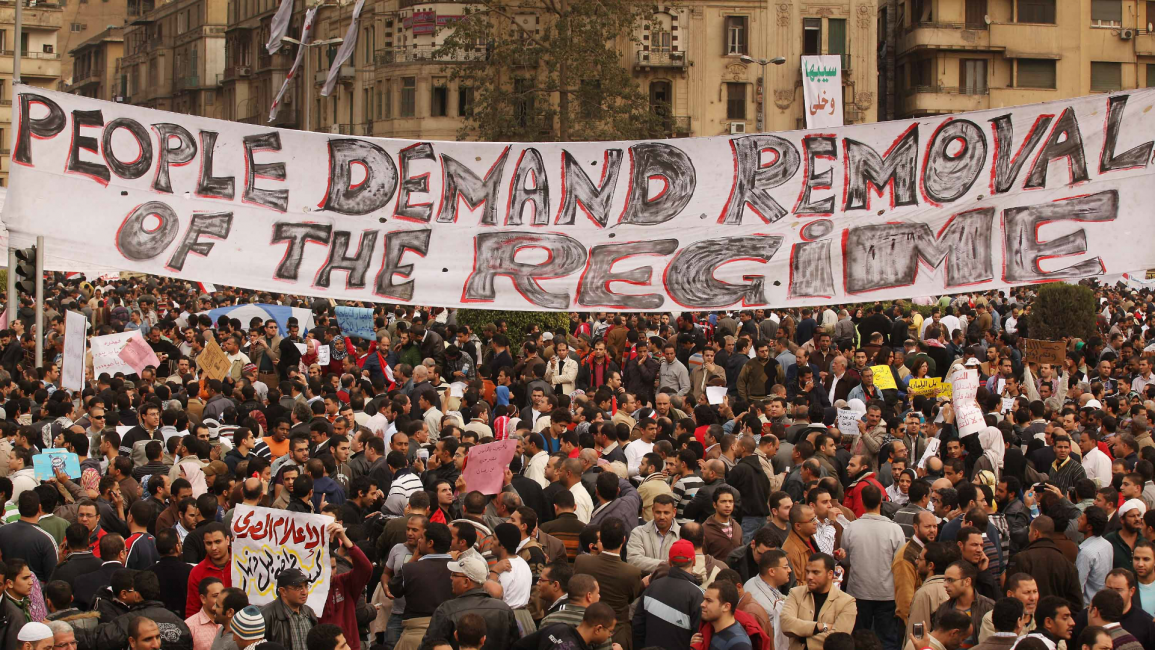
Arabs understand democracy - and want more of it
Decades after the establishment of independent nation states in the Arab world, many - particularly those in power - still believe Arab populations are not capable of living under democratic systems.
Arab leaders and foreign observers - orientalists among them - argue Arabs are politically illiterate, culturally backward and have become accustomed throughout their history to subservience to a caliph, sultan or king. In their view, Arabs are not fit to be citizens, just subjects to be governed by a ruler who maintains his position by manipulating blinkered tribalism and lineage - or through pure military power.
Because of this destructive view of Arabs, Arab nations have been ruled by totalitarian regimes, inspirational leaders, a great warrior or the protector of country and its creed. Many versions of the oppressive state appeared, such as the state dominated by a single nationalist ideal, the closed religious state, the artificial republic and the authoritarian secular state.
| Any opposition to the ruling authority was considered heresy and talk of democracy was taboo. |
Arabs were oppressed by all of these, deprived of the means to express their will or opinion, not actually participating in public life, and without the ability to choose their representatives or rulers.
Despite protest movements here and there against despotic regimes, any opposition to the ruling authority was considered heresy and talk of democracy was taboo. Meanwhile, intellectuals co-opted by the authorities theorised the concept of the benevolent dictator, an all-encompassing leader who is never disobeyed or questioned.
Because of this, people acquiesced to dictatorships.
Repression engenders resistance
However, continued repression created an awareness and solidarity, and muffled cries of protest turned into uprisings in the face of oppression, demanding freedom, dignity and social justice. Furthermore, demands for development coincided with demands for democracy, representative governance and the population's inclusion in decision making.
The 2014 Arab Opinion Index, issued by the Arab Centre for Research and Policy Studies, which polled 26,618 participants from 14 countries, is the largest poll of its kind in the Arab world. It used open-ended questions as opposed to restricting participants to one set of answers.
The poll indicated a growing awareness of democracy and its implications in modern Arab society. A full 38 percent of participants defined democracy as the preservation of personal and political rights, and 24 percent linked it to equality and justice for all citizens. Another ten percent defined it as a system that ensures the peaceful transition of power and the separation of powers, while only 13 percent associated democracy with security and economic development.
A majority of 72 percent view democracy as the basis of a just state that ensures personal and public freedom, founded on a peaceful transfer of power.
 |
|
| Mohammad Afefa [al-Araby al-Jadeed] |
The results also indicate we are witnessing a new and rising Arab consciousness that values freedom, eager to express itself and participate in public life in a pluralist state governed with integrity, not by nepotism.
It is useful to note most participants did not describe democracy negatively, while 65 percent disagreed with the statement that economic performance was bad under democracies, and that democracies were not useful in preserving public order.
Furthermore, 73 percent of those polled agreed that political systems should be democratic, as, despite its problems, democracy was better than religious, non-religious or military dictatorships. Only 17 percent opposed democracy as a system of governance.
Most interesting was that 57 percent did not mind a political party they disagreed with in government, as long as it came to power through the electoral process. This proves we are witnessing the rise of a new Arab political culture, one that recognises differences, and believes in pluralism and the peaceful transfer of power.
A new Arab democratic culture
From this poll, we can conclude the following:
1 - The view that Arabs are incapable of understanding democracy and practicing it no longer holds, as most Arabs today are aware of and knowledgeable about democratic systems.
2 - Arab citizens are aware that democratic states are founded on freedom and justice, not the monopolisation of power for the interest of a specific group.
| |
The age of the authoritarian state... has come to an end in the collective culture of Arabs. |
3 - Most Arabs today believe government is a responsibility, not an honour bestowed on just anyone, that it is a collective civil project and not a personal, elitist or classist achievement.
4 - The age of the totalitarian and authoritarian state that bases its power on religion, tribalism, sectarianism, classism or pure military superiority has come to an end in the collective culture of Arabs. A new consciousness has arisen, eager to build a democratic state.
5 - Modern Arabs accept pluralism and welcome competition for power through the electoral process, as opposed to the use of force.
Will this new democratic consciousness be utilised to build progressive Arab states? Will civil society organisations employ the culture of democracy in the transition toward the institutionalisation of democracy? Will Arab decision makers use the Arab Opinion Index to develop and democratise the relationship between rulers and the ruled? These questions remain unanswered.
Anouar Jamaoui is a Tunisian university lecturer and researcher with an interest in journalism, cultural anthropology, political Islam and translation. He was awarded the Arab Prize in the Social Sciences and Humanities by the Arab Centre for Research & Policy Studies.
Opinions expressed in this article remain those of the original author and do not necessarily reflect the opinions of al-Araby al-Jadeed, its editorial board or staff.
This article is an edited translation from our Arabic site


